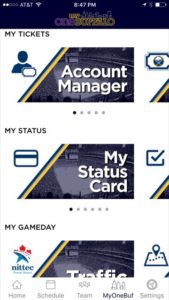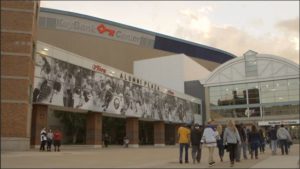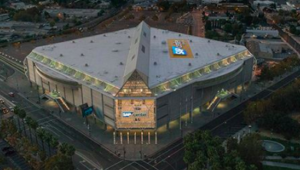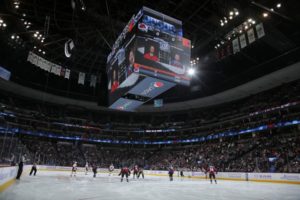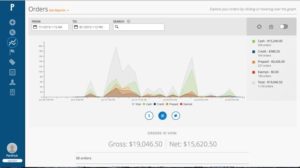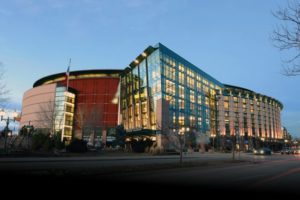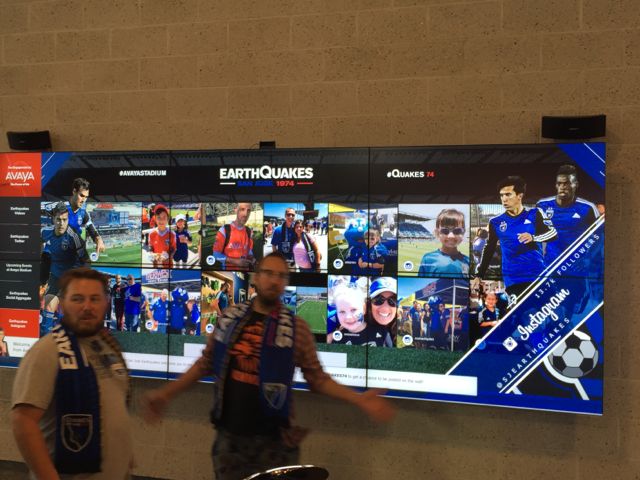With its recently launched MyOneBuffalo app, Pegula has integrated electronic tickets, venue information (parking, concessions, restrooms) and player data, as well as some video extras for the Bills’ version. But MyOneBuffalo also features a digital wallet along with a loyalty program access, where the points and features are automated – scanned or activated by proximity to in-venue iBeacons, rather than via input manually by fans. Inaudible tone technology in the app will be able to detect when fans are tuned in to a game on TV and credit them for watching (provided a fan has enabled location services for the app). MyOneBuffalo also has a “Find Friends” function that allows fans to connect with Facebook friends during games or other events.
Most of that is pretty standard fare for pro team apps. Where MyOneBuffalo distinguishes itself is on the backend. It’s integrated on Venuetize’s mobile platform, which hosts a variety of functionality from Authorize.net (PCI-compliant payment processing); Delaware North (hospitality, food service management); Experience (fan upgrade software); Micros (Oracle’s point-of-sale system); Radius Networks (iBeacons, geo-fences); Skidata (loyalty rewards portal); Ticketmaster and Tickets.com (ticketing systems); TruCa$h (physical gift cards); RetailPro (merchandise POS system); and YinzCam (mobile app development).
Higher expectations for fans
After traveling to lots of NFL and NHL games, owner Kim Pegula challenged her management staff to meet fans’ higher expectations of the venues, technology and their relationship to the team, according to John Durbin, director of marketing for Pegula Sports and Entertainment. “The impetus behind MyOneBuffalo was enhancing the fan experience,” he told Mobile Sports Report.
Venuetize is hosting three versions of MyOneBuffalo: One for the Bills, a second for the Sabres, and a standalone version, which can be used by either visitors to the HarborCenter entertainment district, fans at home, or supporters of the Buffalo Bandits, the city’s National Lacrosse League franchise (also owned by Pegula).Like other owner-managers of professional sports teams, Pegula is looking to MyOneBuffalo to gain deeper insights about fans’ movement, behavior and spending.
“They [Pegula Sports and Entertainment] are trying to get the 360-degree view of the fan,” said Karri Zaremba, founder and chief operations officer of Venuetize. “They wanted a mobile app that would work seamlessly across all their properties and brands.”
Once fully deployed, MyOneBuffalo will provide more insights to attendance numbers, assess the impact of various campaigns and initiatives, and measure purchasing patterns, social activity and any correlations. This is fertile ground for the application of predictive analytics, a holy grail in business at the moment, not just in sports and entertainment, to allow organizations to anticipate better, save money and delight customers, or in this case, fans.
“When we started to align our business operations with the Bills, we had a lot of different data sources across our entities, so one challenge was that we had no way to connect dots between someone going to lots of Bills and Sabres games,” Durbin said. “So to have an analytics platform that collects all this data and know that it’s the same fan gives us data to make their experience more customized—and a better experience, quite honestly.”
Adding restaurants and retail to game-day experiences
Network upgrades have been recently completed at New Era Field (formerly Ralph Wilson Stadium) where the Bills play; KeyBank Center for the Sabres; and the adjacent HarborCenter, a hockey-themed, mixed-use development that includes a Marriott hotel, a two-story restaurant-bar with flatscreens everywhere, and lots of retail, that opened in 2014. “The trend that’s happening right now is these entertainment districts for teams with restaurants and retail,” Durbin explained. “We’re trying to create a seamless experience across these three venues. We wanted an app with similar features, regardless of which location you’re at.”
MyOneBuffalo taps six different location-based technologies: beacons; geo-fences; inaudible tones; Wi-Fi; image recognition; and wearables – MyOneBuffalo is integrated with FitBit.Inaudible tones can be used in a couple different ways. They can be played through the public address system or the software developer’s kit can detect it so that it triggers something. Inaudible tones can be used for basic data collection or more interactive features, where a sponsor offers a premium. “We’re still working through ways to use the inaudible tone,” Durbin said. “We don’t have a clear timetable as to when that will be available.”
The Pegula organization is looking at other ways to tap MyOneBuffalo. At the top of that list is reducing wait times for gates or concessions and re-directing fans to ones that are less busy, Durbin said. They’re also looking at methods to pre-order concessions or merchandise so a fan doesn’t have to wait in line; they can walk up later, scan their receipt and walk away with their order. “We want to add features and create a robust experience for fans,” Durbin said.
